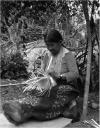Abstract
The Kamsá craftsmen and their craftsmanship play a very important role in the social and cultural life in the Sibundoy Valley. In their products,carvers, weavers, producers of musical instruments, basketmakers, and artisans working with beads represent in different wayshistories, aesthetics, values, and techniques which give an account of the life of this community and of the relations with their environmentand with the “others”. Throughout history, the Kamsá have been visited by different institutions and organizations, which has causedconflictive power relations in terms of knowledge, creative processes, the organization of production, and the use of the handcrafts.The objective of this research is to interpret these power relations in the craftwork sector and the corresponding identity changesand continuities of the Kamsá community. In this research, five fields of power in craftsmanship – evangelization, the Peace Corps,the Escuela Bilingüe Artesanal Kamsá (Kamsá bilingual handcraft school), Artesanías de Colombia (Handcrafts of Colombia), andthe Centro de Desarrollo Artesanal (handcraft development centre) – will be studied in their heterarchical dominant-dominatedrelations which generate autonomous, appropriate, imposed, or alienated cultural processes. Hermeneutics and participatoryprocesses of co-creation have allowed elucidating the cultural resistance of these craftsmen, and this has been their great victory. .Apuntes is registered under a Creative Commons Attribution 4.0 International Public License. Thus, this work may be reproduced, distributed, and publicly shared in digital format, as long as the names of the authors and Pontificia Universidad Javeriana are acknowledged. Others are allowed to quote, adapt, transform, auto-archive, republish, and create based on this material, for any purpose (even commercial ones), provided the authorship is duly acknowledged, a link to the original work is provided, and it is specified if changes have been made. Pontificia Universidad Javeriana does not hold the rights of published works and the authors are solely responsible for the contents of their works; they keep the moral, intellectual, privacy, and publicity rights.
Approving the intervention of the work (review, copy-editing, translation, layout) and the following outreach, are granted through an use license and not through an assignment of rights. This means the journal and Pontificia Universidad Javeriana cannot be held responsible for any ethical malpractice by the authors. As a consequence of the protection granted by the use license, the journal is not required to publish recantations or modify information already published, unless the errata stems from the editorial management process. Publishing contents in this journal does not generate royalties for contributors.

